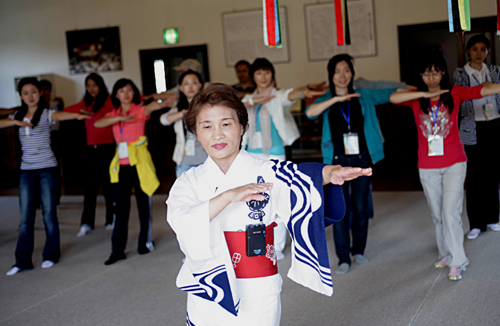Asia-Pacific
Hey big spenders: Japan courts Chinese tourists
By Qin Jize (China Daily)
Updated: 2010-07-01 07:36
 |
Large Medium Small |
Beijing - Japan will further relax visa requirements for Chinese citizens on Thursday to attract an increasing number of big-spending Chinese tourists to help Japan recover from its prolonged economic downturn.
 Chinese tourists (behind) practice Gujo Hachiman traditional dance their their tutor in Japan on May 29, 2010. [China Daily] |
The Japanese government will cut the income requirement of Chinese applying for tourist visas from 250,000 yuan ($37,000) to 60,000 yuan and increase the number of consulates in China accepting applications to seven from three.
The move extends the availability of Japanese travel visas from wealthy Chinese to the middle class.
| ||||
According to the latest report by the Japan National Tourism Organization, around 110,000 Chinese visited Japan for business or travel in May, up 86 percent from a year earlier, when Japan began to issue individual Chinese tourist visas.
It is estimated that the number of Chinese tourists heading to Japan will reach 1.5 million this year.
Beijing-based Japanese writer and commentator Kato Yoshikazu said Japan, as a country not known for its openness to outsiders, is being forced to welcome more Chinese visitors, whose spending is helpful amid worrisome deflation, a slump in domestic spending and a public debt problem.
"It is for sure that the relaxing of Chinese tourist visas is an important policy that will have a positive impact on the Japanese economy," Yoshikazu said.
He said it may help Japan reach its target of increasing the number of foreign visitors to 25 million by 2020.
For Chinese tourists, shopping is their first and most popular activity during their stay in Japan. Yang Man, a 32-year-old banking staff who is planning for her second trip to Japan, said the superior quality of electronic appliances and various kinds of innovative and user-friendly daily necessities are her shopping targets.
There are a large number of reports on Chinese tourists spending money in Japanese shopping districts rather than at tourist sites.
The Wall Street Journal said Chinese tourists are to Japan today what the Japanese were to Manhattan and Honolulu during the late 1980s.
The Associated Press quoted Kouichi Ueno, chief official of the international tourism promotion division at the government-run Japan Tourism Agency, as saying that China's demand for overseas travel, especially among wealthy people, is about to explode.
He called on the government to create further incentives to encourage Chinese travelers to return repeatedly to Japan.
Tokyo has declared overseas tourism one of Japan's growth engines as its aging population shrinks.
Zhou Yongsheng, professor with China University of Foreign Affairs, said as industrial output falls on lower production of autos and other goods for export, Japan needs to develop its tertiary industries such as tourism and medical care.
Japan's economy is currently hitting a bump as the nation's industrial output is seeing further slowdown in overseas demand while the jobless rate edged up and household spending dropped.
While the total number of overseas visitors to Japan decreased 19 per cent in 2009 due to the global financial crisis, China became the only single source of foreign tourists that kept growing thanks to its stable economy. The number of Chinese tourists rose 0.6 per cent to one million.
The same report showed that while foreign visitors in the five-month period totaled approximately 3.5 million, Chinese accounted for 17 percent, Americans 8 percent and British 2 percent.
A survey by Japan's tourism organization showed that the purchasing power of Chinese tourists in Japan has exceeded that of tourists from the United States and Europe.
While the Japanese tourism authority and business circles are busy preparing for the swarm of Chinese tourists, a negative voice was also heard in the right-wing Japanese newspaper Sankei Shimbun.
It said the majority of Japanese people do not welcome Chinese visitors out of fear for the worsening of local public security, or that the Chinese people would stay in Japan.
In response to such worries, Yoshikazu said that though Sankei Shimbun does not represent mainstream Japanese media, such concerns are understandable.
"The Japanese government should take the responsibility of removing such fears by strictly inspecting the visa approving process," he said.
Zhou also said Chinese are no longer the way ordinary Japanese perceive them, with rising income making many things different.
But analysts also urged Chinese travelers to improve the quality of their travel experience by putting more focus on appreciating Japanese culture, scenery and its advanced environmental protection technology, and not just shopping.



